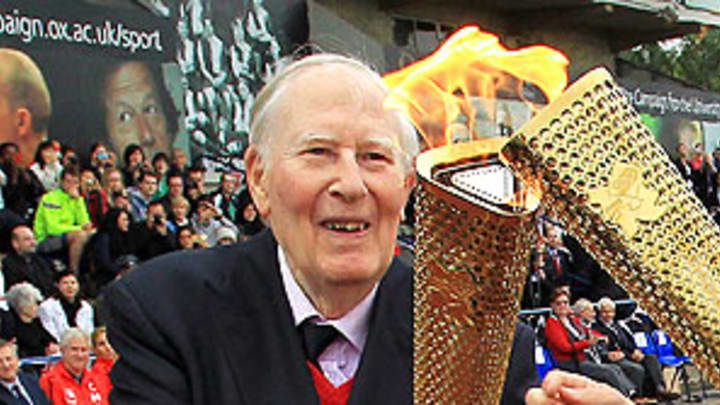Britain's Sir Roger Bannister a top prospect to light Olympic flame


"At 83, I'm not expecting to play any particular role."
The words of Sir Roger Bannister, from May of last year, when I asked him what his involvement with the 2012 London Olympics would be.
"What about lighting the Olympic flame?" I asked.
"That's for people who are young and able to run," Bannister said.
Bannister, who in 1954 became the first man to break the four-minute mile, has not been able to run since the summer of 1975. He was driving back to London from a weekend at his country house in Leominster with his wife, Moyra, and three children when an oncoming car swerved across the centerline and smashed into the driver's side of his car. Bannister's right ankle was shattered, and his running days -- even his jogging days -- were over.
But, I reminded him, Muhammad Ali did not run when he lit the flame in Atlanta in 1996, and it was one of the all time great Olympic moments.
"No, no, no," he shook his head.
But what other athlete still gets 10 snail-mail requests a week for an autograph (and returns them)?
"I think there are footballers who can," he said.
Noticing his great regard for decorum, and the walls of his Oxford home lined with pictures of him with queens, presidents, and dignitaries, I asked: What if the Queen called and asked you personally?
"You're a journalist," Bannister said. "I can see the sort of headlines turning in your head."
It might seem clear that Bannister received his "Sir" for his record-setting mile and his career as a world renowned neurologist -- he helped extend the lifespans of people with autonomic failure -- but actually, it was mainly for his service as the first chairman of the British Sports Council, where he led the Sport for All campaign that expanded access to sports throughout the country. Bannister organized grants for every other town in Britain, to help construct an indoor-outdoor sports facility, and then hoped that passed-over towns would see what their neighbors had and build one of their own accord.
"That did work quite well," Bannister smiled. And that's not to mention that he oversaw the development of the first steroid tests in sports, and was asked by the British government in 1992 to study the role of the university in athletics. (Bannister was a med student at Oxford when he ran his famous mile.)
"There are some American universities where the talented athletes, only 10% of them actually graduate!" Bannister said. "Which is a disgrace, isn't it?"
Who better to light the flame and represent what's left of the spirit of amateurism in sports?
"Well," he laughed, "have we nearly finished, or what?"
The discussion will finish tonight, when the world sees whether Sir Roger lights the flame. Just a week ago, the betting odds on Bannister were 33/1. Bannister only competed in the 1952 Olympics in Helsinki, and there finished fourth in the 1500-meters, prompting the suggestion that his Olympic connection is not deep enough to make him the favorite to light the flame. (British rower Sir Steve Redgrave, by comparison, won five gold medals in five Olympics from 1984 to 2000.) Nonetheless, yesterday, so much money was suddenly placed on Bannister that a major bookmaker in London, William Hill, closed the betting market.
When we talked, Bannister told me that he was looking forward most to the 1500-meters and to "showing off British-ness," but also reveled in the fact that "200,000 people applied to be volunteers, and it is inevitable that young people will be inspired."
These days, Bannister walks. "I have a walking group in Oxford, which I started. There are eight of us, and every month one of us picks a walk somewhere around the countryside and then we meet and have lunch."
And, tonight, he may walk, perhaps all the way to the cauldron.
